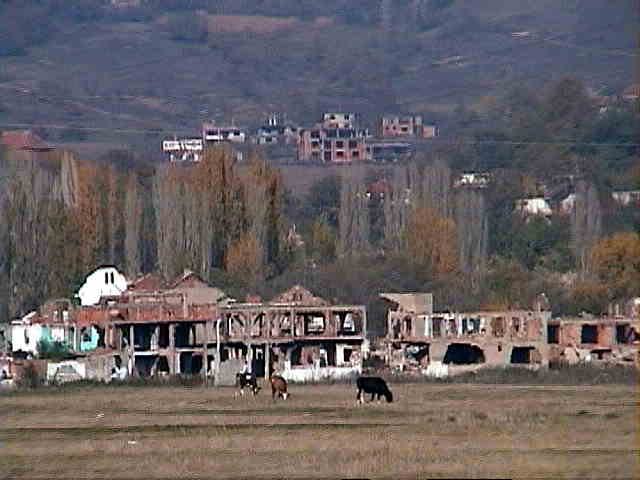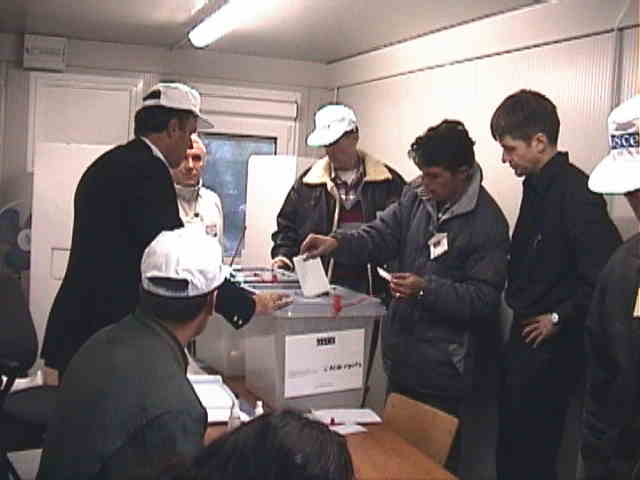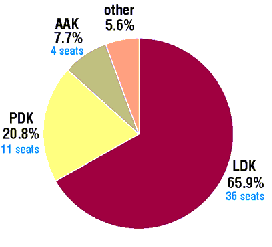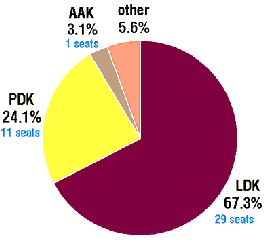Global efforts are under way to raise the values of democratic principles to new levels. But a critical question remains:
How effective are democratic principles, such as free and fair election and government by consent, in resolving ethnic and religious oppression and
conflict, social discrimination (including contempt for women), and poverty in developing countries?
The October 28th municipal elections in the Kosovo province of Yugoslavia, administered by the Organization of Security and Cooperation of
Europe, represented the first step forward toward resolving the region's ethnic conflict in accordance with democratic procedures.
The community of the Kosovo province was totally destroyed by a series of violent incidents triggered by a policy of ethnic cleansing under
former Yugoslav President Slobodan Milosevic. That policy is responsible for the expulsion of ethnic Albanians by the Serbs, which plunged the province
into battle field; the bombing of Yugoslavia by the North Atlantic Treaty Organization and the subsequent stationing of the NATO Kosovo Force (KFOR);
and the return home of ethnic Albanians, which resulted in the expulsion of Serbian residents.
The elections aimed at reconstructing the Kosovar community through the democratic procedure. By establishing a legitimate governing
authority through free, fair and multiparty elections, international society tries to create conditions that would enable the provincial government of
Kosovo to negotiate with the central government of Yugoslavia in Belgrade on an equal footing.
Kosovo, which is still legally a part of the Federal Republic of Yugoslavia, is currently governed by the United Nations Interim
Administration Mission in Kosovo (UNMIK) under U.N. Security Council resolution 1224. Ethnic Albanians make up 80 percent of Kosovo's population of
about 2 million; the rest are Serbs (supported by the central government of Serbia), Romas, and minorities such as Bosniacs and Turks.

Destructed town in Mitrovica
As a member of the Council of Europe's short-term election observing team, I visited Mitrovica, a key city in northern Kosovo, and
surrounding areas. The river Ibar, which runs through the city, is controlled by the Albanians on the southern side and by Serbs on the north. All three
bridges on the river were destroyed by NATO bombs.
During my visit, only the central bridge, then being reconstructed by French troops, was open to vehicle traffic. However, KFOR soldiers
checked every person and vehicle at both ends of the bridge. A tank stood in the middle with its engine running.
Albanians on the south side of the river are not allowed to visit freely the northern side, while Serbs on the northern side are prohibited
from going to the southern side. Under the circumstances free passage will only lead to renewed violence between the two groups.
It is difficult for even a foreigner to reach an isolated Serb or Albanian area. For example, Zubin Potok, a predominantly Serbian town on
the southern side, 15 kilometers west of Mitrovica, normally can be reached in about 15 minutes by car on the main road. But if you want to visit a Serb
district, you have to hire a cab driven by a Serb who will take a detour to avoid any Albanian areas. He cannot follow the main road on the south bank
of the river Ibar. It took me two and a half hours to get to the town.
Zubin Potok contains an Albanian enclave called Cebra. Under Milosevic's rule, Serb residents destroyed all Albanian homes in Cebra.
Temporary housing has been set up by the United Nations High Commissioner for Refugees, using some of the prefabricated units assembled in Kobe after
the 1995 Great Hanshin Earthquake.
To visit the village you have to take a car driven by a foreigner - a Japanese, a German or somebody else who is not a Kosovar. If your
driver is an Albanian, he is likely to be dragged out of his car and beaten up and the vehicle will be burned in the Serbian quarter. If your driver is
a Serb, he will be treated in the same way when you arrive at the Albanian village of Cebra.
Elections were held for 30 municipal assemblies in Kosovo province. Voting took place at 1,500 polling stations across the province,
lasting from seven in the morning to seven at night. Each municipal assembly elects a municipal administrator as chairman of the assembly; this person
is equivalent to prefectural governor or city mayor in Japan. Each municipal assembly has between 17 and 51 seats.
The Serbs boycotted the elections, but the vote was free from major acts of physical interference by Serbs or overt intimidations by
Albanian radicals. Everything went according to plan, except that at the close of voting at 7 p.m. many people were still waiting in queues. This is
because it took time to identify each person who was listed in the voters' register along with his or her photo.
In the Albanian village of Cebra in Serb quarter, more than 80 percent of 520 registered Albanian voters safely cast ballots. In the
Serb-dominated town of Zvecan only 11 Serbs registered and one of them voted. It is significant that Serbs who were willing to vote - as well as
Albanians - were able to do so in a peaceful environment despite the massive Serb boycott.

First voter casts ballot in Cebra
The election outcome was different from the forecast by professionals. The Democratic League of Kosovo (LDK), led by Dr. Ibrahim Rugova, a
devotee of Mahatma Gandhi's doctrine of non-violent resistance and an advocate of Kosovar independence through dialogue with Belgrade, won a majority in
at least 21 of the 30 administrative district assemblies.
By contrast, the Democratic Party of Kosovo (PDK), headed by Hashim Thaci, former leader of the militant Kosovo Liberation Army, gained
control of only six western district assemblies.
Majority of Kosovo Albanians, who had tried to achieve independence by force during Milosevic's reign, changed their strategy in favor of
independence through dialogue after a year of working for civilian reconstruction under UNMIK rule. It can be said that the Western attempt to use
democratic elections as a vehicle to begin efforts to resolve ethnic problems in Kosovo achieved a great success.
A problem remains, however, as Serbs in Kosovo boycotted the vote. Dr. Bernard Kouchner, the special representative of the U.N. secretary
general in Kosovo did not certified the election results of the three northern Serbian municipalities due to low voter turnout. The key question for the
future, therefore, is how they can be brought into a democratically established system of governance in Kosovo. Another general boycott may be unlikely,
however, if OSCE conducts by-elections exclusively for the Serb municipalities early next year.
The biggest problem is UNSC resolution 1224, which gives legitimacy to UNMIK rule in Kosovo. The resolution includes a clause that refers
to the "commitment of all Member States to the sovereignty and territorial integrity of the Federal Republic of Yugoslavia.'' That means that if
the Western countries hasten to achieve Kosovo's complete independence, Russia - a permanent member of the U.N. Security Council that has opposed
independence - is likely to exercise its veto in the Security Council. To avoid this, it is necessary to establish a system of democratic governance
that represents all Kosovars.
Rei Shiratori is professor of political science at Tokai University and president of the Institute for Political Studies in Japan.
=====================
Results of Kosovo municipal elections
From OSCE home page
http://www.osce.org/kosovo/elections/
Pristina (Capital)

Mitrovica (North City)


